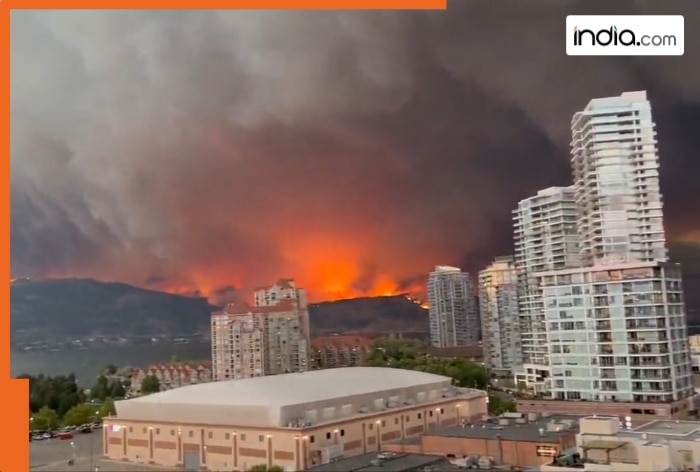World
Canadian Forest Fires Spread Smoke, Trigger Air Quality Alerts

Smoke from the devastating Canadian forest fires is now affecting air quality across several regions in North America, prompting health advisories for residents. As of this week, areas in Nebraska, South Dakota, and Minnesota have reported significant declines in air quality, leading authorities to recommend that individuals remain indoors.
Impact on Air Quality in South Dakota
The US Environmental Protection Agency’s (EPA) AirNow platform has classified air quality in large portions of South Dakota as “poor,” with the Air Quality Index (AQI) reaching as high as 167 in extensive areas of Badlands National Park. This level falls within the range of 151-200, which is considered hazardous for sensitive groups. Other areas, including Bennett, Oglala Lakota, Mead, Pennington, and Jackson, have received a “moderate” air quality warning, where the AQI remains below 50.
In light of these conditions, residents are advised to limit outdoor activities, especially vulnerable populations such as children and the elderly.
Conditions in Nebraska and Minnesota
In Nebraska, air quality remains relatively better, with Douglas County and surrounding areas like Omaha and Carter Lake reporting an AQI between 52 and 56, which is categorized as “moderate.” Despite this, authorities continue to monitor the situation closely.
Minnesota is experiencing mixed air quality conditions. Central, east-central, northwestern, and south-central areas, including cities like Coon Rapids and Brooklyn Park, are under a “moderate” alert. However, the northern Twin Cities metro area has seen worsening air quality, leading to advisories for vulnerable individuals to remain indoors.
AirNow has issued a clear warning, urging residents in affected areas to avoid leaving their homes unless absolutely necessary. The organization specifically emphasizes the need for children and the elderly to take precautions due to the health risks associated with poor air quality.
As the situation develops, local and national authorities are expected to provide further updates and guidance for residents impacted by the ongoing forest fires and their effects on air quality.
-

 World5 months ago
World5 months agoSBI Announces QIP Floor Price at ₹811.05 Per Share
-

 Lifestyle5 months ago
Lifestyle5 months agoCept Unveils ₹3.1 Crore Urban Mobility Plan for Sustainable Growth
-

 Science4 months ago
Science4 months agoNew Blood Group Discovered in South Indian Woman at Rotary Centre
-

 World5 months ago
World5 months agoTorrential Rains Cause Flash Flooding in New York and New Jersey
-

 Top Stories5 months ago
Top Stories5 months agoKonkani Cultural Organisation to Host Pearl Jubilee in Abu Dhabi
-

 Sports4 months ago
Sports4 months agoBroad Advocates for Bowling Change Ahead of Final Test Against India
-

 Science5 months ago
Science5 months agoNothing Headphone 1 Review: A Bold Contender in Audio Design
-

 Top Stories5 months ago
Top Stories5 months agoAir India Crash Investigation Highlights Boeing Fuel Switch Concerns
-

 Business5 months ago
Business5 months agoIndian Stock Market Rebounds: Sensex and Nifty Rise After Four-Day Decline
-

 Sports4 months ago
Sports4 months agoCristian Totti Retires at 19: Pressure of Fame Takes Toll
-

 Politics5 months ago
Politics5 months agoAbandoned Doberman Finds New Home After Journey to Prague
-

 Top Stories5 months ago
Top Stories5 months agoPatna Bank Manager Abhishek Varun Found Dead in Well









